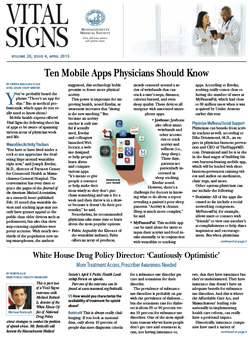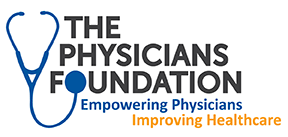Outreach Activities: June 1, 2014 to May 31, 2015
PHS presentations provide information on physician health issues and the role of PHS, and include helpful information about how to identify those at risk, factors that can impact patient care, ways to access help, and steps to improve the physician-patient relationship. More than 2,200 physicians and medical students across Massachusetts were in attendance at PHS presentations this year.
If we haven’t been to your hospital or health care organization, please contact us at (781) 434-7404 or complete the
speaking engagement request form.
PHS presented at, participated in or were in attendance at the following organizations/events:
18th Annual Participants’ Dinner
PHS organizes a special dinner event each fall for participants. The dinner provides us with the opportunity to update participants on program activities, introduce the associate directors and staff, and share experiences of strength and hope. Physicians who have successfully completed the PHS program in the past or who are presently involved in the program are invited to attend.
- 2015 Public Health Leadership Forum
- BIDMC - Chiefs
- Cape Cod Hospital
- Cape Cod Symposium on Addictive Disorders
- CMIC Behavioral Health Study Course
- Cooley-Dickinson Hospital
- Coverys Webinar
- CRICO - PODCast
- Dana Farber Cancer Institute
- Emerson Hospital
- Good Samaritan Medical Center
- Harvard School of Public Health Graduate Student Seminar: Quality, Safety & Physician Health
- HealthAlliance – Leominster Hospital
- Heywood Hospital
- Holyoke Medical Center
- Harvard Vanguard Medical Associates (HVMA)
- HVMA – Compassion Fatigue
- HVMA Leadership In-Service
- Journal of Graduate Medical Education Discussion: Preventing Depression and Suicide Among Physicians in Training
- Lawrence General Hospital
- Massachusetts Psychiatric Society
- Massachusetts Veterinary Medical Association (MVMA) Winter CE Conference
- Men’s Health Symposium
- Mercy Medical Center
- MetroWest Medical Center - Resident
- Milton Hospital
- MMS Committee on Ethics, Grievances and Professional Standards – Ethics & Pain Management
- Nashoba Valley Medical Center
- NSMC – Salem Hospital – Grand Rounds
- NSMC – Union Hosptial – Grand Rounds
- Partners CMO/CNO Meeting
- Saint Anne’s Hospital
- Southcoast Health Annual Meeting
- Steward Norwood Hospital
- Tufts University School of Medicine – Michael Palmer MD Medical Student Lecture Series
- Tufts Medical Center – GME Committee
- Tufts Medical Center – Physician Health Committee
- UMASS Medical School – 2nd year students
- UMASS Psychiatry Residents Welcome
- Wing Memorial Hospital
PHS has a large and growing footprint in online and print media. PHS’s physician health-related content was viewed by tens of thousands of physicians and other health care professionals in the form of webinars, podcasts, blog posts and the monthly MMS Vital Signs newsletter.
Articles, Presentations, and Consultations
One of the most important activities of Physician Health Services is educating physicians, residents, medical students, health care administrators, hospitals, and the public regarding the prevention, early identification, and treatment of addiction and other illnesses that affect physicians. Areas emphasized include stress prevention, prescribing practices, communication skills, and time management. PHS also provides education regarding the types of services we offer, which go well beyond support for substance use disorders. PHS services include assistance with physical, emotional, and behavioral problems as well.
Facing the Loss of a Physician
PHS experiences great sadness when a physician is lost as a result of an illness or unexpected death. During times such as these, PHS makes every effort to provide support to the physician’s family and colleagues. We recognize the tremendous grief a family faces and share each loss with the medical community. It is important for PHS to ensure that outreach is supportive, comprehensive, and helpful while remaining respectful of physician confidentiality.
Articles regarding issues of physician well-being are a regular feature in Vital Signs, the monthly member publication of the Massachusetts Medical Society. These articles also appear on the Massachusetts Medical Society website at
www.massmed.org/vitalsigns.
PHS regularly exhibits materials at conferences and professional meetings, where we are able to personally meet with physicians and present the various ways in which the program can be of service to them. (
See the speaking engagement request form here.)
Vital Signs
Physician Health Services features a monthly column in the Medical Society’s member newsletter, Vital Signs. The column is dedicated to timely topics of interest related to physician health and wellness. You can contact PHS for a copy of any of the articles, or visit
www.massmed.org/vitalsigns. Articles Published June 2014 to May 2015
 Volume 19, Issue 6 – Summer 2014
Volume 19, Issue 6 – Summer 2014
What Works For You? New Health Care Blog Shares Stories - Volume 19, Issue 7 – September 2014
''I Had No Idea I Could Get in Trouble for That!'': Guidelines for M.D.s and Recreational Alcohol/Drug Use - Volume 19, Issue 8 – October 2014
Strategies for Mastering the Medical Marathon - Volume 19, Issue 9 – November 2014
One M.D.'s Story: Managing Workplace Conflict - Volume 20, Issue 1 – December 2014/January 2015
Physician Burnout: Where Do We Go from Here? - Volume 20, Issue 2 – February 2015
Occupational Challenges and Professional Coaching: Help Available at PHS: Coaches Help Docs Prevent Burnout and Meet Goals - Volume 20, Issue 3 – March 2015
Healing Thyself: Self-Referrals to PHS for Coaches, Psychiatrists, and Therapists Has Doubled: Physicians Wish to Optimize Performance, Health, and Happiness - Volume 20, Issue 4 – April 2015
PHS Support Groups: Unique Atmosphere of Support and Trust for Physicians - Volume 20, Issue 5 – May 2015
Establishing a Culture of Trust Through Ongoing Feedback
Managing Workplace Conflict: "Improving Leadership & Personal Effectiveness"
 An educational program jointly sponsored by the Massachusetts Medical Society and Physician Health Services, Inc. and supported by a grant from The Physicians Foundation.
An educational program jointly sponsored by the Massachusetts Medical Society and Physician Health Services, Inc. and supported by a grant from The Physicians Foundation.
Recognizing that disruptive behaviors and interpersonal challenges can impact and interfere with a physician’s ability to practice medicine effectively, PHS designed the Managing Workplace Conflict program to help attendees assess difficult relationships and stressful situations and consider ways to respond differently to minimize conflict.
This program is an educational forum for all physicians (both those in clinical practice and those in administration and leadership) to explore the relationships that drive the medical work environment. Disruptive behaviors and managerial miscommunications can impact a physician’s ability to practice medicine effectively or a medical organization’s ability to function smoothly. The course aims to allow participants to develop techniques to improve relationships with physician colleagues, coworkers, and patients, thereby improving the quality of the overall work environment. This course will help attendees assess difficult relationships and stressful situations in the workplace and consider ways to minimize conflicts. This is an experiential course that uses real (de-identified) workplace conflicts supplied in advance by attendees as examples for exploration and change. The program combines didactic presentations with roleplaying and focused feedback in an interactive style to learn and practice improved interactive techniques and communication methods. The program focuses on developing skills and motivation to make lasting changes. Attendees are then invited to return for a facilitated session three months after each course is offered to provide feedback and updates on their ability to effectuate and sustain change at their worksite.
Twice each year, PHS offers this interactive program that combines didactic presentations, roleplaying exercises, and focused feedback with the motivation to make changes in the way physicians and physician leaders interact with their colleagues and patients. Pre-, post-, and follow-up evaluations demonstrate improvement in the skills of the physicians who attend. Both hospitals and physicians welcome this tangible resource to assist physicians with interpersonal communication, conflict resolution, and stress management. PHS is proud to have developed such a successful program.
The program is available to all physicians who strive to improve their leadership skills and personal effectiveness with relationships at work, and to enhance their skills for addressing difficulties that arise in the workplace environment, both as practitioners and as leaders.
Course Instructors
 Steve Adelman, MD, is director of Physician Health Services. Dr. Adelman is a board-certified psychiatrist with extensive clinical and administrative experience in addiction psychiatry and addiction medicine.
Steve Adelman, MD, is director of Physician Health Services. Dr. Adelman is a board-certified psychiatrist with extensive clinical and administrative experience in addiction psychiatry and addiction medicine.
 Diana Barnes Blood, MSW, LICSW, has private practices in Lincoln and Brookline working with individuals and couples in psychotherapy. She currently facilitates a support group three times a month designed to provide physicians with strategies to enhance coping skills.
Diana Barnes Blood, MSW, LICSW, has private practices in Lincoln and Brookline working with individuals and couples in psychotherapy. She currently facilitates a support group three times a month designed to provide physicians with strategies to enhance coping skills.
 Melissa Brodrick, MEd, is the Ombudsperson for Harvard’s Medical School, School of Dental Medicine, and School of Public Health. She has worked in private practice, helping individuals engage in effective communications and problem solving while navigating high-impact workplace and family issues.
Melissa Brodrick, MEd, is the Ombudsperson for Harvard’s Medical School, School of Dental Medicine, and School of Public Health. She has worked in private practice, helping individuals engage in effective communications and problem solving while navigating high-impact workplace and family issues.
 Diana L. Dill, EdD, is a consultant, coach, educator, researcher, and behavioral health provider with more than 20 years of experience helping clients address their development goals and work problems. Through Working Together for HealthSM she adapts evidence-based psychology to the unique needs of clinicians. With Working Together Coaching and ConsultingSM, she helps highly trained and innovative individuals, professional practices, and small businesses across industries to address their achievement challenges.
Diana L. Dill, EdD, is a consultant, coach, educator, researcher, and behavioral health provider with more than 20 years of experience helping clients address their development goals and work problems. Through Working Together for HealthSM she adapts evidence-based psychology to the unique needs of clinicians. With Working Together Coaching and ConsultingSM, she helps highly trained and innovative individuals, professional practices, and small businesses across industries to address their achievement challenges.
 Les Schwab, MD, is a primary care physician with 35 years of experience in medical practice and health care organizational leadership. He is certified in coaching and operates a coaching and consulting practice focused on physician performance and leadership development.
Les Schwab, MD, is a primary care physician with 35 years of experience in medical practice and health care organizational leadership. He is certified in coaching and operates a coaching and consulting practice focused on physician performance and leadership development.
 Jo Shapiro, MD, FACS, serves as chief of the Division of Otolaryngology in the Department of Surgery at Brigham and Women’s Hospital (BWH). She is an associate professor of otolaryngology at Harvard Medical School, and the founding director of the BWH Center for Professionalism and Peer Support
Jo Shapiro, MD, FACS, serves as chief of the Division of Otolaryngology in the Department of Surgery at Brigham and Women’s Hospital (BWH). She is an associate professor of otolaryngology at Harvard Medical School, and the founding director of the BWH Center for Professionalism and Peer Support
At the end of this two-day program, attendees share strategies they learned that they feel will be most valuable for practical application in the practice setting. Here are some strategies physicians shared: I have learned valuable techniques for approaching conflicts: The goal is to change bad behavior-not character.
I learned that when there is a breakdown in trust between staff from poor communication and poor behavior there are real consequences to patient outcomes. Everyone wants good patient outcomes and this is a good common ground when trying to negotiate difficult conversations respectfully with a cool head.
The course provided tools that are able to be put in use immediately in the practice and administrative duties.
I will attempt to be more clear and concise when discussing various matters with colleagues (and family and friends as well.)
I will attempt to be less impulsive and emotional when confronting a difficult work situation or scenario.
I will listen better to what people are saying around me (or by their body language (non-verbal language.)
I'm going to try to develop a culture of greater feedback.
The faculty was excellent, available and supportive. It felt very safe with some of the difficult and high risk situations discussed. I have been singing the praises of this course to my colleagues.
PHS Is Available to Your Hospital or Medical Practice
PHS is available to provide tailored educational programs appropriate for the following:
- Hospital grand rounds
- Group medical practices
- Health care organizations
- Specialty society meetings
Our goal is to reach every Massachusetts health care organization and medical school on an annual basis. Presentations are eligible for CME credit and meet the criteria for risk management study. Please contact us to coordinate an educational program at your organization.
The Joint Commission, an independent, not-for-profit organization that accredits and certifies more than 17,000 health care organizations and programs in the United States, adopted a physician health requirement (Physician Health MS.2.6) effective January 1, 2001. In 2004, the Joint Commission further expanded the requirement to all health care professionals (originally LIP Health MS.06, now MS.11.01.01). This provision requires the medical staffs of all hospital organizations to implement a process to identify and manage the health of licensed, independent practitioners separate from medical staff disciplinary functions. One element of the Joint Commission requirement is annual education on matters of physician health. PHS consults with medical staff, medical executive committees, and hospitals throughout the state to help them implement and maintain this requirement by providing presentations.
In addition, effective January 1, 2009, the Joint Commission instituted a leadership standard for accreditation programs (LD.03.01.01) that focuses on maintaining a culture of safety and quality by addressing inappropriate behaviors in two of its elements of performance. First, the hospital/organization must have a code of conduct that defines acceptable and disruptive and inappropriate behaviors (EP 4). Second, leaders must create and implement a process for managing disruptive and inappropriate behaviors (EP 5). Additionally, standards in the medical staff chapter have been organized to follow six core competencies to be addressed in the credentialing process, including interpersonal skills and professionalism (see the introduction to MS.11.01.01). The Joint Commission issued an advisory on November 9, 2011, regarding the disruptive behavior standard. It clarified that the phrase “disruptive behavior” is intended to include “behavior or behaviors that undermine a culture of safety.” This clarification came about for a few reasons, such as:
- The term “disruptive” was not viewed favorably by some in health care.
- “Disruptive” alone can be ambiguous to some audiences.
- Strong advocates for patient care improvements can be viewed as “disruptive.”
- The term can be used in settings temporarily unsettled by patient behavior.
The Joint Commission also has a leadership standard LD.02.04.01 to address how a hospital should manage conflict between leadership groups to protect the quality and safety of care. The standard states that a hospital should engage an individual with conflict management skills to implement and carry out the conflict management process. The process should include (1) meeting with the involved parties as early as possible to identify the conflict, (2) gathering information regarding the conflict, (3) working with the parties to manage and, when possible, resolve the conflict, and (4) protecting the safety and quality of care. PHS is available for consultation with medical staff and hospital leadership on policies in these areas, for individual circumstances, or to provide educational programs.
Dr. Adelman has contributed to the Massachusetts Medical Society’s
Each Patient Counts Weblog. Please visit this blog on hot topics related to physician health and wellness. Opinions expressed here are his own, and do not necessarily reflect those of the Massachusetts Medical Society or Physician Health Services.
Presentations provide up-to-date information on physician health issues and the role of PHS and include a discussion on how to identify those at risk, factors that can impair patient care, ways to access help, and steps to improve the physician-patient relationship. An educational DVD about PHS, brochures, and other supportive materials are also available.
The speaking engagement request form can be found online here.
Board of Registration in Medicine
PHS is independent of the Board of Registration in Medicine (BRM), the state agency responsible for the licensure and discipline of physicians in Massachusetts. However, PHS serves as an important resource for physicians dealing with licensing issues as a result of health impairment or other health concerns. PHS helps facilitate physicians’ interactions with the BRM by educating physicians about licensing procedures, providing documentation of compliance for physicians being monitored, and offering resources for outside services and legal representation to assist with board actions.
PHS regularly interacts with the staff as the BRM responsible for health-related matters. PHS meets with the BRM staff each month to provide continuity for physicians under monitoring agreements with both PHS and the BRM and enhance communication regarding areas of mutual concern, including physician support services, remediation, and protection of the public. PHS also meets periodically with BRM members and staff to address policy and programmatic issues likely to impact physicians facing health problems.
Exception to Mandated Reporting
Important Exception to Mandatory Reporting to the Board of Registration in Medicine
Diversion to PHS is possible when all of the following criteria apply:
- The circumstances involve a drug or alcohol problem.
- There is no allegation of patient harm or other violation of law.
- The physician agrees to participate in PHS.
- The reporter receives confirmation from PHS within 30 days that the physician is compliant with the program.
Massachusetts law requires certain health care professionals to report to the BRM when they become aware that a physician has violated BRM rules or regulations. This includes reporting when there is a reasonable basis to believe that a physician is a habitual user of drugs or alcohol, is practicing medicine while impaired by drugs or alcohol, or is impaired in the ability to practice as a result of a mental health concern.
Under specific circumstances, instead of making this report to the BRM, a referral can be made to PHS, allowing the physician to obtain remedial services. This is possible only in the case of drug/alcohol matters, when there is no allegation of patient harm, no other violation of the law, the physician agrees to participate in PHS, and the reporter receives timely confirmation from PHS that the physician is in compliance with our program (within 30 days). By serving as an approved program, PHS is able to provide confidential support services and assistance to a wider range of physicians who face drug and alcohol problems. Currently this exception to mandated reporting is approved only for drug and alcohol issues, however, PHS is hopeful that in the future the exception will be extended to other health conditions, including mental health issues.
At times, the BRM itself enters into disciplinary or nondisciplinary agreements with physicians who face health challenges such as substance use disorders, mental illness, behavioral health concerns, or physical health concerns that require support and monitoring. In these circumstances, the BRM often asks PHS to provide monitoring. PHS then provides the BRM with confirmation that the physician is compliant with a treatment plan while simultaneously providing the physician with professional and personal support.
